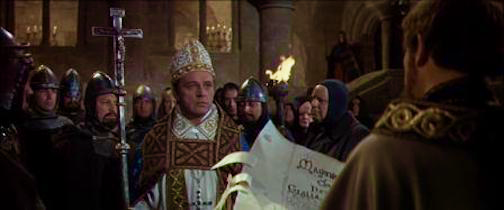One of my favorite scenes in the movie Becket (if one can single out a thread from that masterpiece) is the moment when the eponymous archbishop is confronted by King Henry’s lieutenants, who try to arrest him on trumped-up charges. Archbishop Becket appears fully vested, mitered and coped, with ferula in hand. As he approaches the crowd of soldiers and nobleman, he holds out the crucifix-topped staff, causing the gruff men to backpedal. When Robert de Beaumont begins to read out the charges, Becket calls him by his first name, then warns him, “Robert de Beaumont, hear me for the sake of your soul, which is in the gravest danger.”
He then denies the charges and announces to the gathered mob, “As head of the Church of England and as your spiritual father, I forbid you to pass judgment on me. I command you and all who would charge me to hold your peace on pain of endangering your immortal souls.” As he begins to leave and is confronted by one soldier, he upbraids him, “Sheathe your sword, Morville, before you impale your soul upon it!” Becket is allowed to depart.
It is difficult to imagine such a scenario today in a film, let alone in the Western world. Would a bishop who is confronted with such animosity stand up to his accusers and invoke his apostolic authority? Would such a rabble back down rather than simply seizing the cleric and clapping him in irons, as a prelude to much worse?
Such questions seem academic, relating only to tales from a world long gone. Yet in certain parts of the world today, these spiritual and moral encounters are being repeated. China has no qualms about arresting bishops, or of holding them for years until they die in prison. Even in nations with deep Christian histories, such as the quickly disintegrating Nicaragua, bishops and cardinals are finding themselves under attack.
But surely such things are for dictatorships and failed states, we say. Surely it could not happen here.
I think that, before very long, we shall see.

The animosity of formerly Christian countries toward the Church is ramping up. After voters eliminated Ireland’s constitutional protection for the unborn, the Irish government has said that Catholic hospitals that wish to keep their government funding will be required to perform abortions. This from a nation that still televises the Angelus every day. And some Australian states have recently passed a law requiring priests who hear of child sexual abuse and other serious crimes in the confessional to break the sacramental seal and report it to the police.
Many Australian priests and at least one bishop have publicly stated they will not comply with the law, which – depending on the state – would mean a hefty fine or even jail time.
If push comes to shove, will they follow through? Will bishops help to pay the fines of their priests, or visit them if they are jailed? Will the Irish bishops be willing to forgo government funding rather than submit to the new abortion regime?
One can hope that the bishops will have the courage, should the time come, to stand by their convictions. Even in a time of increasing secularization and hostility toward the Church in Western countries, bishops still have largely remained respected figures. They are invited to important civil functions and given places of honor. They receive politicians and are pleased to release statements on this or that bill proposed in the legislature.
But things could become quite different quite quickly. In fact, seem likely to. The late Cardinal Francis George may have had it exactly right when he said, “I expect to die in bed, my successor will die in prison and his successor will die a martyr in the public square.”
Too strong? Perhaps. Perhaps not. But consider this, too: imagine the opportunity suddenly present to give a living testimony for the faith. As Alfie Evans lay dying in a Liverpool hospital, (while his parents were barred from removing him to seek further help), one commentator wrote, “What if the archbishop walked into the hospital and said, ‘This boy and his family are leaving with me’?” If he were allowed to leave, what solace that would have given the family; if he were arrested, what a powerful witness that would have shown.
It may soon be the case that it will not be enough for society to reject the Church’s teaching; it may feel compelled to silence and squash the institution itself. But this will not be because secular society is finding itself growing strong and wishes to crush a rival. It will be because society, having rejected truth, finds itself terminally ill, and it will rage at the physician whose diagnosis is sound but undesired.
Then, God willing, the last portion of Cardinal George’s statement may come to fruition: “His successor will pick up the shards of a ruined society and slowly help rebuild civilization, as the church has done so often in human history.”














